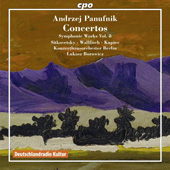

1} Violin Concerto - Alexander Sitkovetsky (Violin)
2} Cello Concerto - Raphael Wallfisch (Cello)
3} Piano Concerto - Ewa Kupiec (Piano)
This is the final volume in the outstanding CPO series of recordings covering all of the orchestral music by Polish composer Andrzej
Panufnik (1914-1991). Here you can read a previous review on the Volume 1
in the series, which also includes a link to a website dedicated to the composer, where you will find plenty of pertinent information. He is, in my opinion, one of
the best composers of his generation, but yet remains one of the least performed or recorded. He has a very distinctive sound which, despite the fact that his
writing technique evolved dramatically over the years, shines through from his earliest works to his last, which happens to be the 1991 Cello Concerto.
The première occured posthumously in 1992, featuring the great Mstislav Rostropovich as soloist with the London Symphony Orchestra. You can certainly tell that
Panufnik's favorite instrument was the cello, as it holds constant prominence in this concerto, especially in its focused lament throughout the slow and plaintive
first movement. Cellist Raphael Wallfisch's impeccable control over the long, sustained notes, lends the music a tense, grim and implacable
atmosphere.
The Piano Concerto from 1961, revised in 1972 and again in 1983 to include an extra movement, is a much more extroverted
and virtuosic work, with two powerful and agitated outer movements with somewhat of a jazzy angle to some of the piano writing, sandwiching a mysterious slow
middle movement of profound beauty, which recalls the style of his post-war masterpiece titled "Nocturne". The writing here is sparse, in the belief that less is more,
which allows each and every note on the piano to be pregnant with meaning and reflection. Pianist Ewa Kupiec's playing certainly brings out
this work's polarity from sharp rhythms to misty dreams. It's always in the longer, aching slow movements that the soul and essence of Andrzej Panufnik predominate
over technique, and where his best writing shines through, and again the Adagio movement of the Violin Concerto certainly
supports this. It reaches a point of utmost beauty at the 6:33 mark given all of its expressive weight by Alexander Sitkovetsky, who brings
the whole movement to a peaceful and blissful close.
For his efforts in this project, Polish conductor Lukasz Borowicz has received the International Classical Music Award in the Special Achievement category.
Many thanks to the people at CPO for producing this significant cycle of recordings. It certainly ends on a high note.
Jean-Yves Duperron - November 2014